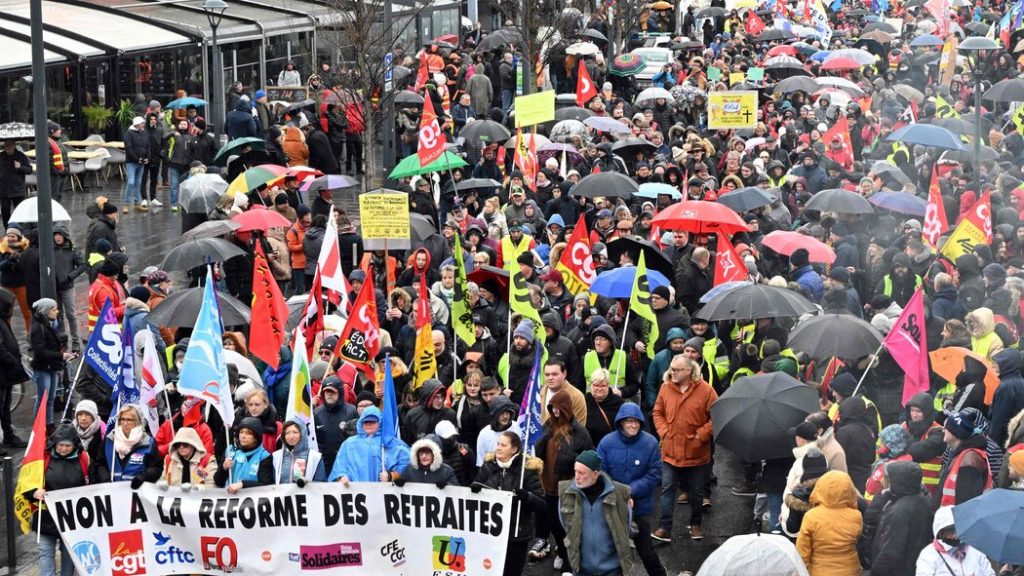By Marlon Ettinger
With its validation on April 14 by the Constitutional Council, Emmanuel Macron’s government has finally passed its legislation to raise the pension age to sixty-four. Its controversial passage into law has prompted vast opposition: refinery workers have held petrol shipments hostage, dockers have blocked deliveries, and a sustained strike by garbage collectors left uncollected bags piling up on the streets of Paris for weeks. So what are the government’s next steps?
In a televised address to the nation on Monday, Macron set out a three-pronged agenda claiming to move the country forward. He said he’d heard the anger in the streets, but that the answer to this should be neither “paralysis [nor] extremism.” Instead, Macron promised to move forward — by opening more professional high schools, by making moves to get people on welfare back into work, and by overhauling education so that students would be able to master French and mathematics and absent teachers could be more efficiently replaced.
Macron also said the country’s health care system would be rebuilt, and that the country would move “toward a new ecological and productive model” by unveiling an environmental plan in the summer. Yet behind the soft glove of these vague promises (including one vow for students to “exercise more at school”) was the iron fist. Macron has heard the anger on the streets: his response now is a pledge to hire ten thousand more magistrates and employees for the justice system and two hundred new gendarme (military police) brigades.
This was in many ways a typical Macron “reset” speech — a familiar routine where he promises a bold, transformative agenda. Yet a more realistic picture of his actual short-term plans can be found in the upcoming 2024 budget. Despite widespread opposition, the government continues to push forward with further plans attacking the country’s social model. On the docket next are deep cuts to social programs in the coming year’s budget.
“Between inflation [and] retirement . . . the limit has already been reached,” said Nicolas, a nuclear technician who’d come to protest in Paris last month with around twenty of his coworkers in the Union Syndicale Solidaires (SUD). He isn’t alone in thinking this. From outside the country, Macron’s position looks shaky and diminished, with warnings from even the conservative business press that this situation represents the end of his domestic agenda, or even the obsolete nature of the Fifth Republic’s presidentialist model. But Macron has no intention of stopping now. France’s pavements may groan with millions of protesters, but he’s already set his eyes on the next prize.
Marianne Maximi, who represents a district in Puy-de-Dôme, in central France, had already denounced the 2023 budget as “a large return of austerity in our country.”“The result,” Maximi said, “is €11 billion in budget cuts. . . . It’s the second-most austerian budget in the past two decades.”What this meant concretely, Maximi explained, was a major negative impact on local services: school cafeterias, libraries, public pools, and heating in schools.“Children are cold, and they will continue to be,” she said. France Insoumise wouldn’t vote for the 2023 budget, Maximi finished, because “austerity kills.”“They’re going to continue closing beds in hospitals, in the middle of a crisis!”
Already under the conservative president Nicolas Sarkozy, from 2007 to 2012, some 37,000 hospital beds were cut. His successor, François Hollande, cut a further 10,000. Then in Macron’s first five-year term starting in 2017, despite the coronavirus pandemic and a lockdown justified by a critical lack of hospital beds, the government cut a further 21,000 of them.
Macron’s austerity policies are, indeed, not so new. France Insoumise leader Jean-Luc Mélenchon called his 2017 budget one that fit well for the rich, and wrote that his 2020 budget “looted the state.” But during the exceptional economic crisis provoked the pandemic, some of Macron’s cost-cutting ambitions were curtailed by necessity to prevent a full-scale collapse of the economy. Macron’s agenda sought to contain the crisis by implementing a fiscal policy that was widely, if deceptively, known as “whatever it costs.”
Today, all those temporary half-measures — like anti-inflationary checks and grants to stabilize the cost of petrol and fuel — are on the chopping block. Last fall, Gabriel Attal, the minister of public accounts, announced that the era was over. “We’ve passed from ‘whatever it costs’ to ‘how much it costs,’” he said in an interview with Le Parisien.
Since January, Le Maire has been reviewing the government’s spending. Now the contours of the new budget are taking shape. This spring, there’s a week of meetings planned between ministers to work together on reducing public spending.
But an advisor to France Insoumise told Jacobin that in reality, the lion’s share of Macron’s reductions to public spending will come at the expense of social programs. They explained how any talk of reducing “brown expenses” is an illusion — and cutting aid to businesses isn’t likely either.
In theory, reducing these “brown expenses” would take the form of closing a series of tax loopholes. But a government working group, composed primarily of pro-Macron MPs, has already been put together by the Finance Ministry to work on a piece of legislation for green industry. Their bill should be presented in the next few weeks. That group, the France Insoumise advisor said, determined that it would be “counterproductive and premature” to go after tax credits on brown expenses. It’s unlikely, the France Insoumise advisor concluded, that cuts in spending will come from this.
As for the notion that the government would cut spending on aid to businesses, the advisor was equally skeptical. Since Macron became president, they said, aid to businesses had exploded — indeed, it’s risen by €80 billion since 2017. The trend was present even before the pandemic, between 2017 and 2019, when expenditures rose by €30 billion.
ÉricBerr, an associate professor at the University of Bordeaux, echoed this analysis. Berr, who’s also the co-director of the Department of Economics at the Institut La Boétie — France Insoumise’s think tank — told me that Le Maire’s latest announcements follow the same logic of the government’s stability program. That’s a document that the government sends to Parliament and the European Commission every year detailing their plan to reduce the deficit.“Their objective is to reduce the public deficit . . . [to below] 3 percent of GDP by 2027,” Berr explained. That’s the deficit goal that the EU sets for its member states.
At the same time, the government’s program for reducing this deficit rests solely on increasing GDP growth, with the option of raising taxes excluded completely. Quite the contrary, Berr said — their goal is to cut taxes. “So if they want to reduce the public deficit, and at the same time reduce taxes, there will have to be a high impact on social spending.” (IPA Service)
Courtesy: Jacobin

 Oil Supply By Russia At Concessional Rate Is A Big Shield For India Against Inflation
Oil Supply By Russia At Concessional Rate Is A Big Shield For India Against Inflation 